- Home
- Brand, Max
The Night Horseman
The Night Horseman Read online
The Project Gutenberg EBook of The Night Horseman, by Max Brand
This eBook is for the use of anyone anywhere at no cost and with almost no restrictions whatsoever. You may copy it, give it away or re-use it under the terms of the Project Gutenberg License included with this eBook or online at www.gutenberg.net
Title: The Night Horseman
Author: Max Brand
Release Date: May 26, 2004 [EBook #12436] Last Updated: August 13, 2009
Language: English
*** START OF THIS PROJECT GUTENBERG EBOOK THE NIGHT HORSEMAN ***
Produced by Suzanne Shell and PG Distributed Proofreaders
By Max Brand
The Untamed Trailin'
The Night Horseman
THE NIGHT HORSEMAN
BY
MAX BRAND
1920
CONTENTS
I.—THE SCHOLAR
II.—WORDS AND BULLETS
III.—THE DOCTOR RIDES
IV.—THE CHAIN
V.—THE WAITING
VI.—THE MISSION STARTS
VII.—JERRY STRANN
VIII.—THE GIFT-HORSE
IX.—BATTLE LIGHT
X.—"SWEET ADELINE"
XI.—THE BUZZARD
XII.—FINESSE
XIII.—THE THREE
XIV.—MUSIC FOR OLD NICK
XV.—OLD GARY PETERS
XVI.—THE COMING OF NIGHT
XVII.—BUCK MAKES HIS GET-AWAY
XVIII.—DOCTOR BYRNE ANALYSES
XIX.—SUSPENSE
XX.—THE COMING
XXI.—MAC STRANN DECIDES TO KEEP THE LAW
XXII.—PATIENCE
XXIII.—HOW MAC STRANN KEPT THE LAW
XXIV.—DOCTOR BYRNE LOOKS INTO THE PAST
XXV.—WEREWOLF
XXVI.—THE BATTLE
XXVII.—THE CONQUEST
XXVIII.—THE TRAIL
XXIX.—TALK
XXX.—THE VOICE OF BLACK BART
XXXI.—THE MESSAGE
XXXII.—VICTORY
XXXIII.—DOCTOR BYRNE SHOWS THE TRUTH
XXXIV.—THE ACID TEST
XXXV.—PALE ANNIE
XXXVI.—THE DISCOVERY OF LIFE
XXXVII.—THE PIEBALD
XXXVIII.—THE CHALLENGE
XXXIX.—THE STORM
XL.—THE ARROYO
XLI.—THE FALLING OF NIGHT
XLII.—THE JOURNEY INTO NIGHT
THE NIGHT HORSEMAN
CHAPTER I
THE SCHOLAR
At the age of six Randall Byrne could name and bound every state in the Union and give the date of its admission; at nine he was conversant with Homeric Greek and Caesar; at twelve he read Aristophanes with perfect understanding of the allusions of the day and divided his leisure between Ovid and Horace; at fifteen, wearied by the simplicity of Old English and Thirteenth Century Italian, he dipped into the history of Philosophy and passed from that, naturally, into calculus and the higher mathematics; at eighteen he took an A.B. from Harvard and while idling away a pleasant summer with Hebrew and Sanscrit he delved lightly into biology and its kindred sciences, having reached the conclusion that Truth is greater than Goodness or Beauty, because it comprises both, and the whole is greater than any of its parts; at twenty-one he pocketed his Ph.D. and was touched with the fever of his first practical enthusiasm—surgery. At twenty-four he was an M.D. and a distinguished diagnostician, though he preferred work in his laboratory in his endeavor to resolve the elements into simpler forms; also he published at this time a work on anthropology whose circulation was limited to two hundred copies, and he received in return two hundred letters of congratulation from great men who had tried to read his book; at twenty-seven he collapsed one fine spring day on the floor of his laboratory. That afternoon he was carried into the presence of a great physician who was also a very vulgar man. The great physician felt his pulse and looked into his dim eyes.
"You have a hundred and twenty horsepower brain and a runabout body," said the great physician.
"I have come," answered Randall Byrne faintly, "for the solution of a problem, not for the statement thereof."
"I'm not through," said the great physician. "Among other things you are a damned fool."
Randall Byrne here rubbed his eyes.
"What steps do you suggest that I consider?" he queried.
The great physician spat noisily.
"Marry a farmer's daughter," he said brutally.
"But," said Randall Byrne vaguely.
"I am a busy man and you've wasted ten minutes of my time," said the great physician, turning back to his plate glass window. "My secretary will send you a bill for one thousand dollars. Good-day."
And therefore, ten days later, Randall Byrne sat in his room in the hotel at Elkhead.
He had just written (to his friend Swinnerton Loughburne, M.A., Ph.D., L.L.D.): "Incontrovertibly the introduction of the personal equation leads to lamentable inversions, and the perceptive faculties when contemplating phenomena through the lens of ego too often conceive an accidental connotation or manifest distortion to be actuality, for the physical (or personal) too often beclouds that power of inner vision which so unerringly penetrates to the inherent truths of incorporeity and the extramundane. Yet this problem, to your eyes, I fear, not essentially novel or peculiarly involute, holds for my contemplative faculties an extraordinary fascination, to wit: wherein does the mind, in itself a muscle, escape from the laws of the physical, and wherein and wherefore do the laws of the physical exercise so inexorable a jurisdiction over the processes of the mind, so that a disorder of the visual nerve actually distorts the asomatous and veils the pneumatoscopic?
"Your pardon, dear Loughburne, for these lapses from the general to the particular, but in a lighter moment of idleness, I pray you give some careless thought to a problem now painfully my own, though rooted inevitably so deeply in the dirt of the commonplace.
"But you have asked me in letter of recent date for the particular physical aspects of my present environment, and though (as you so well know) it is my conviction that the physical fact is not and only the immaterial is, yet I shall gladly look about me—a thing I have not yet seen occasion to do—and describe to you the details of my present condition."
Accordingly, at this point Randall Byrne removed from his nose his thick glasses and holding them poised he stared through the window at the view without. He had quite changed his appearance by removing the spectacles, for the owlish touch was gone and he seemed at a stroke ten years younger. It was such a face as one is glad to examine in detail, lean, pale, the transparent skin stretched tightly over cheekbones, nose, and chin. That chin was built on good fighting lines, though somewhat over-delicate in substance and the mouth quite colourless, but oddly enough the upper lip had that habitual appearance of stiff compression which is characteristic of highly strung temperaments; it is a noticeable feature of nearly every great actor, for instance. The nose was straight and very thin and in a strong sidelight a tracery of the red blood showed through at the nostrils. The eyes were deeply buried and the lower lids bruised with purple—weak eyes that blinked at a change of light or a sudden thought—distant eyes which missed the design of wall paper and saw the trees growing on the mountains. The forehead was Byrne's most noticeable feature, pyramidal, swelling largely towards the top and divided in the centre into two distinct lobes by a single marked furrow which gave his expression a hint of the wistful. Looking at that forehead one was strangely conscious of the brain beneath. There seemed no bony structure; the mind, undefended, was growing and pushing the confining walls further out.
And the fragility which the head suggested the body confirmed, for he was not framed to labor. The burden of the no
ble head had bowed the slender throat and crooked the shoulders, and when he moved his arm it seemed the arm of a skeleton too loosely clad. There was a differing connotation in the hands, to be sure. They were thin—bones and sinews chiefly, with the violet of the veins showing along the backs; but they were active hands without tremor—hands ideal for the accurate scalpel, where a fractional error means death to the helpless.
After a moment of staring through the window the scholar wrote again: "The major portion of Elkhead lies within plain sight of my window. I see a general merchandise store, twenty-seven buildings of a comparatively major and eleven of a minor significance, and five saloons. The streets—"
The streets, however, were not described at that sitting, for at this juncture a heavy hand knocked and the door of Randall Byrne's room was flung open by Hank Dwight, proprietor of Elkhead's saloon—a versatile man, expert behind the bar or in a blacksmith shop.
"Doc," said Hank Dwight, "you're wanted." Randall Byrne placed his spectacles more firmly on his nose to consider his host.
"What—" he began, but Hank Dwight had already turned on his heel.
"Her name is Kate Cumberland. A little speed, doc. She's in a hurry."
"If no other physician is available," protested Byrne, following slowly down the stairs, "I suppose I must see her."
"If they was another within ten miles, d'you s'pose I'd call on you?" asked Hank Dwight.
So saying, he led the way out onto the veranda, where the doctor was aware of a girl in a short riding skirt who stood with one gloved hand on her hip while the other slapped a quirt idly against her riding boots.
CHAPTER II
WORDS AND BULLETS
"Here's a gent that calls himself a doc," said Hank Dwight by way of an introduction. "If you can use him, Miss Cumberland, fly to it!"
And he left them alone.
Now the sun lay directly behind Kate Cumberland and in order to look at her closely the doctor had to shade his weak eyes and pucker his brows; for from beneath her wide sombrero there rolled a cloud of golden hair as bright as the sunshine itself—a sad strain upon the visual nerve of Doctor Randall Byrne. He repeated her name, bowed, and when he straightened, blinked again. As if she appreciated that strain upon his eyes she stepped closer, and entered the shadow.
"Doctor Hardin is not in town," she said, "and I have to bring a physician out to the ranch at once; my father is critically ill."
Randall Byrne rubbed his lean chin.
"I am not practicing at present," he said reluctantly. Then he saw that she was watching him closely, weighing him with her eyes, and it came to the mind of Randall Byrne that he was not a large man and might not incline the scale far from the horizontal.
"I am hardly equipped—" began Byrne.
"You will not need equipment," she interrupted. "His trouble lies in his nerves and the state of his mind."
A slight gleam lighted the eyes of the doctor.
"Ah," he murmured. "The mind?"
"Yes."
He rubbed his bloodless hands slowly together, and when he spoke his voice was sharp and quick and wholly impersonal. "Tell me the symptoms!"
"Can't we talk those over on the way to the ranch? Even if we start now it will be dark before we arrive."
"But," protested the doctor, "I have not yet decided—this precipitancy—"
"Oh," she said, and flushed. He perceived that she was on the verge of turning away, but something withheld her. "There is no other physician within reach; my father is very ill. I only ask that you come as a diagnostician, doctor!"
"But a ride to your ranch," he said miserably. "I presume you refer to riding a horse?"
"Naturally."
"I am unfamiliar with that means of locomotion," said the doctor with serious eyes, "and in fact have not carried my acquaintance with the equine species beyond a purely experimental stage. Anatomically I have a superficial knowledge, but on the one occasion on which I sat in a saddle I observed that the docility of the horse is probably a poetic fallacy."
He rubbed his left shoulder thoughtfully and saw a slight tremor at the corners of the girl's mouth. It caused his vision to clear and concentrate; he found that the lips were, in fact, in the very act of smiling. The face of the doctor brightened.
"You shall ride my own horse," said the girl. "She is perfectly gentle and has a very easy gait. I'm sure you'll have not the slightest trouble with her."
"And you?"
"I'll find something about town; it doesn't matter what."
"This," said the doctor, "is most remarkable. You choose your mounts at random?"
"But you will go?" she insisted.
"Ah, yes, the trip to the ranch!" groaned the doctor. "Let me see: the physical obstacles to such a trip while many are not altogether insuperable, I may say; in the meantime the moral urge which compels me towards the ranch seems to be of the first order." He sighed. "Is it not strange, Miss Cumberland, that man, though distinguished from the lower orders by mind, so often is controlled in his actions by ethical impulses which override the considerations of reason? An observation which leads us towards the conclusion that the passion for goodness is a principle hardly secondary to the passion for truth. Understand that I build the hypothesis only tentatively, with many reservations, among which—"
He broke off short. The smile was growing upon her lips.
"I will put together a few of my things," said the doctor, "and come down to you at once."
"Good!" said the girl, "I'll be waiting for you with two horses before you are ready."
He turned away, but had taken hardly a step before he turned, saying: "But why are you so sure that you will be ready before I—" but she was already down the steps from the veranda and stepping briskly down the street.
"There is an element of the unexplainable in woman," said the doctor, and resumed his way to his room. Once there, something prompted him to act with the greatest possible speed. He tossed his toilet articles and a few changes of linen into a small, flexible valise and ran down the stairs. He reached the veranda again, panting, and the girl was not in sight; a smile of triumph appeared on the grave, colourless lips of the doctor. "Feminine instinct, however, is not infallible," he observed to himself, and to one of the cowboys, lounging loosely in a chair nearby, he continued his train of thoughts aloud: "Though the verity of the feminine intuition has already been thrown in a shade of doubt by many thinkers, as you will undoubtedly agree."
The man thus addressed allowed his lower jaw to drop but after a moment he ejaculated: "Now what in hell d'you mean by that?"
The doctor already turned away, intent upon his thoughts, but he now paused and again faced the cowboy. He said, frowning: "There is unnecessary violence in your remark, sir."
"Duck your glasses," said the worthy in question. "You ain't talkin' to a book, you're talking to a man."
"And in your attitude," went on the doctor, "there is an element of offense which if carried farther might be corrected by physical violence."
"I don't foller your words," said the cattleman, "but from the drift of your tune I gather you're a bit peeved; and if you are—"
His voice had risen to a ringing note as he proceeded and he now slipped from his chair and faced Randall Byrne, a big man, brown, hard-handed. The doctor crimsoned.
"Well?" he echoed, but in place of a deep ring his words were pitched in a high squeak of defiance.
He saw a large hand contract to a fist, but almost instantly the big man grinned, and his eyes went past Byrne.
"Oh, hell!" he grunted, and turned his back with a chuckle.
For an instant there was a mad impulse in the doctor to spring at this fellow but a wave of impotence overwhelmed him. He knew that he was white around the mouth, and there was a dryness in his throat.
"The excitement of imminent physical contest and personal danger," he diagnosed swiftly, "causing acceleration of the pulse and attendant weakness of the body—a state unworthy of the balanced intel
lect."
Having brought back his poise by this quick interposition of reason, he went his way down the long veranda. Against a pillar leaned another tall cattleman, also brown and lean and hard.
"May I inquire," he said, "if you have any information direct or casual concerning a family named Cumberland which possesses ranch property in this vicinity?"
"You may," said the cowpuncher, and continued to roll his cigarette.
"Well," said the doctor, "do you know anything about them?"
"Sure," said the other, and having finished his cigarette he introduced it between his lips. It seemed to occur to him instantly, however, that he was committing an inhospitable breach, for he produced his Durham and brown papers with a start and extended them towards the doctor.
"Smoke?" he asked.
"I use tobacco in no form," said the doctor.
The cowboy stared with such fixity that the match burned down to his fingertips and singed them before he had lighted his cigarette.
"'S that a fact?" he queried when his astonishment found utterance. "What d'you do to kill time? Well, I been thinking about knocking off the stuff for a while. Mame gets sore at me for having my fingers all stained up with nicotine like this."
He extended his hand, the first and second fingers of which were painted a bright yellow.
"Soap won't take it off," he remarked.

 Alcatraz
Alcatraz the Long, Long Trail (1923)
the Long, Long Trail (1923)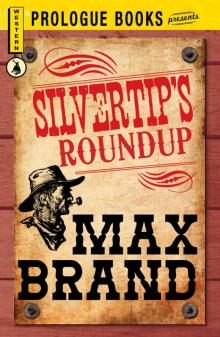 Silvertip's Roundup
Silvertip's Roundup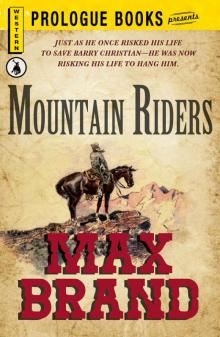 Mountain Riders
Mountain Riders Silvertip (1942)
Silvertip (1942)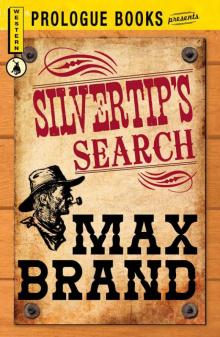 Silvertip's Search
Silvertip's Search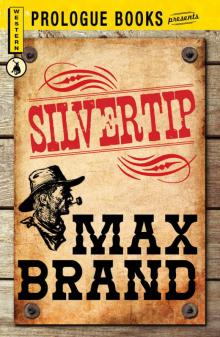 Silvertip
Silvertip Bull Hunter
Bull Hunter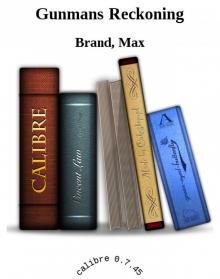 Gunmans Reckoning
Gunmans Reckoning The Seventh Man
The Seventh Man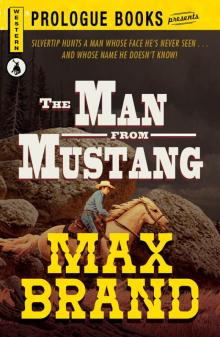 Man From Mustang
Man From Mustang Riders of the Silences
Riders of the Silences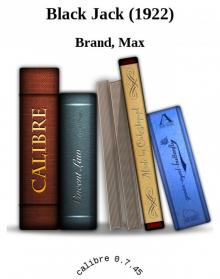 Black Jack (1922)
Black Jack (1922) Way of the Lawless
Way of the Lawless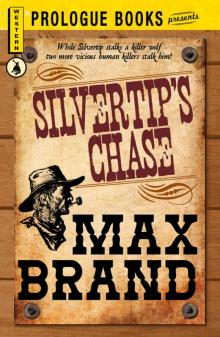 Silvertip's Chase
Silvertip's Chase Trailin
Trailin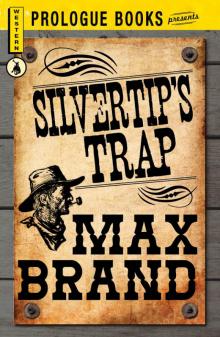 Silvertip's Trap
Silvertip's Trap Ronicky Doone (1921)
Ronicky Doone (1921) The Night Horseman
The Night Horseman the Garden Of Eden (1963)
the Garden Of Eden (1963)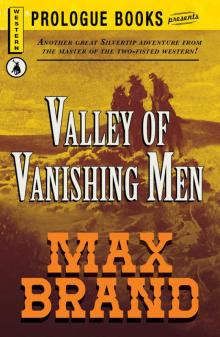 Valley of the Vanishing Men
Valley of the Vanishing Men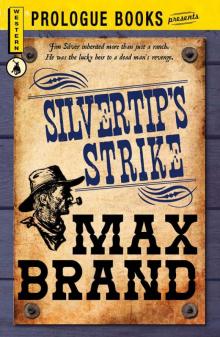 Silvertip's Strike
Silvertip's Strike Black Jack
Black Jack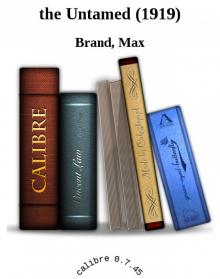 the Untamed (1919)
the Untamed (1919) Way Of the Lawless (1921)
Way Of the Lawless (1921) The Untamed
The Untamed